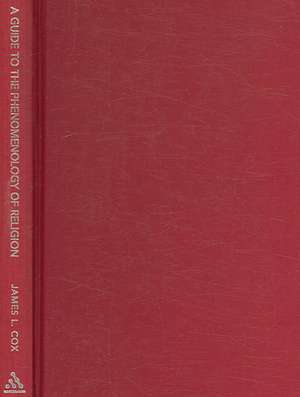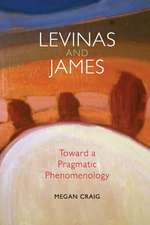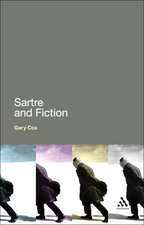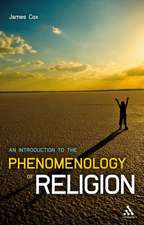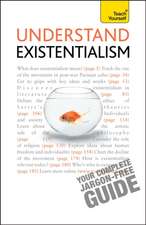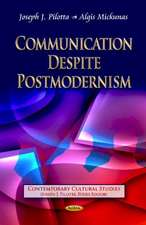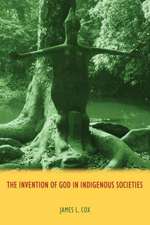A Guide to the Phenomenology of Religion: Key Figures, Formative Influences and Subsequent Debates
Autor James L. Coxen Limba Engleză Hardback – 14 iun 2006
| Toate formatele și edițiile | Preț | Express |
|---|---|---|
| Paperback (1) | 374.83 lei 43-57 zile | |
| Bloomsbury Publishing – 14 iun 2006 | 374.83 lei 43-57 zile | |
| Hardback (1) | 1125.17 lei 43-57 zile | |
| Bloomsbury Publishing – 14 iun 2006 | 1125.17 lei 43-57 zile |
Preț: 1125.17 lei
Preț vechi: 1443.83 lei
-22% Nou
Puncte Express: 1688
Preț estimativ în valută:
215.30€ • 225.36$ • 179.20£
215.30€ • 225.36$ • 179.20£
Carte tipărită la comandă
Livrare economică 31 martie-14 aprilie
Preluare comenzi: 021 569.72.76
Specificații
ISBN-13: 9780826452900
ISBN-10: 0826452906
Pagini: 276
Dimensiuni: 156 x 234 x 21 mm
Greutate: 0.56 kg
Editura: Bloomsbury Publishing
Colecția Continuum
Locul publicării:London, United Kingdom
ISBN-10: 0826452906
Pagini: 276
Dimensiuni: 156 x 234 x 21 mm
Greutate: 0.56 kg
Editura: Bloomsbury Publishing
Colecția Continuum
Locul publicării:London, United Kingdom
Caracteristici
The study of the phenomenology is key to an understanding of religious studies as it sees it as a discipline in its own right.
Cuprins
Introduction Part One: Formative Influences Chapter 1: Edmund Husserl and Philosophical Phenomenology From Descartes to Kant The Significance of Hegel Husserl and the Transformation to Idealism Husserl's Phenomenological Method Chapter 2: Theological Influences: The School of Albrecht Ritschl The Theological Climate at the Time of Ritschl Ritschl's Theology of Religions Wilhelm Herrmann and Religion as Communion with God Ernst Troeltsch: A Bridge to the Social Sciences Chapter 3: Reductionism and the Social Sciences Evolutionary Assumptions in the Study of Primitive Religions Projectionist Theories as Explaining Religion Classic Cases in Social Scientific Reductionism: Durkheim and Freud Part Two: Key Phenomenological Schools Chapter 4: Foundational Figures in the Dutch School of Phenomenology Background to the Study of Religions in the Netherlands C P Tiele and P D Chantepie de la Saussaye: Christianity as a World Theology W Brede Kristensen as Advocate of the Believer Gerardus van der Leeuw and the Formation of Phenomenological Typologies C J Bleeker's Universal Structure of Religion Chapter 5: Phenomenology in the United Kingdom The African Connection: Parrinder, McKenzie, Walls and Harold Turner E O James and Ninian Smart: From Comparative Religion to Phenomenology Frank Whaling and the Study of Religions in Edinburgh Chapter 6: North American Phenomenology: Wach, Eliade and W C Smith History of Religions as Diachronic Phenomenology Joachim Wach's Empathetic Sociology Mircea Eliade: Religon as a Longing for the Sacred Wilfred Cantwell Smith's Meaning and End of Religion Part Three: Subsequent Debates Chapter 7: The Reductionist-Religionist Debate Current Polarities The Reductionists: Segal, Wiebe and Strenski The Anti-Religionists: Fitzgerald and Platvoet Chapter 8: Alternatives to Phenomenology Dialogical Approaches: Panikkar, Krieger and Flood Religion as Cultural Studies The Cognitive Science of Religion Hervieu-Leger and Religion as a Chain of Memory Chapter 9: A New Phenomenology of Religion Self-Reflexivity and the Phenomenological Tradition Knowing the 'Other' within Oneself Converting to the 'Other' as Phenomenological Empathy Bibliography Index
Recenzii
'In less capable hands, the biographies of leading scholars may show us how Religious Studies has evolved, but in this book Cox offers something far more exciting and important. He shows us what it has meant, what it means and what it might yet mean to study religion. In this accessible and engaging book he challenges students of religion to be clear about what we study and how we might study it better. This book should be part of every course in the Study of Religions.' Graham Harvey, Lecturer in Religious Studies, The Open University
'This book is a timely and important analysis for all those studying and researching religions as it examines both the historical and cultural dimensions of some key stages and issues in this academic field. The focus on phenomenologists acknowledges their importance in the development of the religious studies as an interdisciplinary field and highlights the way they have engendered important contemporary and cutting edge debates. The work is both scholarly in its rigor and has balance in the way it engages with criticism. There are many original and very up to date suggestions about possible ways in which debates about methods, scholarly perspectives and the the issue of the social engagement of academics might be viewed.' Peggy Morgan, Lecturer in the Study of Religions, Mansfield College, University of Oxford
'At a time when news programmes are full of stories about religion, the study of religious phenomena in their own right is more important than ever before. In this new book, James L. Cox - a recognised specialist - analyses the key thinkers and the main schools that have formed today's critical thought in the phenomenology of religion. Using a historical approach, he shows their continuing relevance for current debates in the study of religion. This includes the controversial topic of engagement by scholars of religion in the social and political questions of our time. Well organised and clearly written, this comprehensive and illuminating guide will be invaluable both to teachers and students.' Gerrie ter Haar, Professor of Religion, Human Rights and Social Change, Institute of Social Studies, The Hague, The Netherlands
"This important book offers a detailed account of debates within the field of phenomoenology of religion... [It] will greatly interest those concerned with such academic issues and is to be valued as a contribution to the debate." Reviewed by Douglas J. Davies in Theology, 2008
"Cox's book is a mine of information." Reviewed in International Review of Biblical Studies, 2007.
"the Guide will be helpful to anyone who wants to understand the nature of phenomenological thinking about religion, its historical roots and the on-going debates within religious studies that it has generated" Temenos (Nordic Journal of Comparative Religion), 2008
"James Cox offers a succinct but powerful guide to the foundational method utilized by Religious Studies scholars... Cox offers an invaluable Guide to the benefits and demerits of all current approaches to studying" Graham Harvey, Expository Times, September 2007
'This book is a timely and important analysis for all those studying and researching religions as it examines both the historical and cultural dimensions of some key stages and issues in this academic field. The focus on phenomenologists acknowledges their importance in the development of the religious studies as an interdisciplinary field and highlights the way they have engendered important contemporary and cutting edge debates. The work is both scholarly in its rigor and has balance in the way it engages with criticism. There are many original and very up to date suggestions about possible ways in which debates about methods, scholarly perspectives and the the issue of the social engagement of academics might be viewed.' Peggy Morgan, Lecturer in the Study of Religions, Mansfield College, University of Oxford
'At a time when news programmes are full of stories about religion, the study of religious phenomena in their own right is more important than ever before. In this new book, James L. Cox - a recognised specialist - analyses the key thinkers and the main schools that have formed today's critical thought in the phenomenology of religion. Using a historical approach, he shows their continuing relevance for current debates in the study of religion. This includes the controversial topic of engagement by scholars of religion in the social and political questions of our time. Well organised and clearly written, this comprehensive and illuminating guide will be invaluable both to teachers and students.' Gerrie ter Haar, Professor of Religion, Human Rights and Social Change, Institute of Social Studies, The Hague, The Netherlands
"This important book offers a detailed account of debates within the field of phenomoenology of religion... [It] will greatly interest those concerned with such academic issues and is to be valued as a contribution to the debate." Reviewed by Douglas J. Davies in Theology, 2008
"Cox's book is a mine of information." Reviewed in International Review of Biblical Studies, 2007.
"the Guide will be helpful to anyone who wants to understand the nature of phenomenological thinking about religion, its historical roots and the on-going debates within religious studies that it has generated" Temenos (Nordic Journal of Comparative Religion), 2008
"James Cox offers a succinct but powerful guide to the foundational method utilized by Religious Studies scholars... Cox offers an invaluable Guide to the benefits and demerits of all current approaches to studying" Graham Harvey, Expository Times, September 2007
